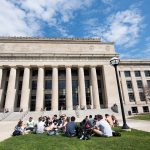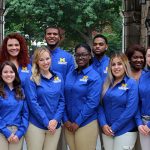Graduate school is often a whirlwind, filled with classes, coursework, and research. An organization of U-M graduate students in the College of Engineering, however, has made K-12 outreach a key part of their experience. The students involved in the American Chemical Society POLY/PMSE Student Chapter at U-M come from interdisciplinary backgrounds and share a passion for science literacy and access to education. For many in the organization, the impetus is often personal.
Ayse Muniz, a 2nd year PhD student in the Macromolecular Science and Engineering Program (MACRO) and co-chair of the organization’s outreach initiative, grew up in a more rural part of New Mexico. There, as she explains, “A lot of students aren’t exposed to the sciences or engineering or…don’t have parents that graduated from college.” To address such experiences, the organization has been visiting classrooms in Michigan’s schools in teams of three to four sharing cutting-edge, interactive activities that translate high-level research into basic science principles relevant to everyday life. After visiting more than 30 schools over the last year, the organization began to explore other avenues to make an impact. As member Rosy Cersonsky, a 4th year MACRO student, relates, “We realized that we can only make it to so many classrooms; so why don’t we bring the teachers here [to campus]?”
This summer, in partnership with CEO, the organization developed REACT (Research Education and Activities for Classroom Teachers), a one day workshop for teachers to learn about groundbreaking research at U-M from faculty and graduate students. The workshop, held on June 26th, 2017 at the University of Michigan-Ann Arbor, included training in hands-on classroom activities, such as “Making Toothpaste”, an activity that puts students in the role of a chemical engineer to design a product with particular criteria and set of constraints, a core theme of the engineering design process. The workshop also included discussions with faculty about how teachers can encourage students to pursue degrees in science, technology, engineering, and mathematics (STEM); teachers explored the breadth of opportunities in STEM through tours of U-M labs and facilities.
From Kalamazoo to Detroit, more than twenty K-12 teachers participated in the inaugural workshop; the impact was positive. As one K-8 science teacher explained, the hands-on experiences can be a great equalizer for English language learners, ensuring that all students are engaged in the classroom. Teresa Tucker, a teacher at Lakeshore Virtual School, noted, “Each researcher was able to explain very technical information in terms our students can understand.” While the distance between the classroom and the research lab may seem vast, another teacher remarked that the workshop “was a great way to bridge the gap between the research community at the university and the educational sphere.”
At Michigan, faculty and researchers are encouraged to share their work with communities in a meaningful way; REACT provided a great platform for this exchange. Like many of the teachers who participated this year, CEO looks forward to an annual workshop.



